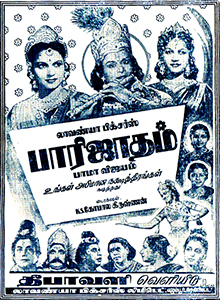
Thenkarai Ramakrishna Mahalingam born in Sholavandan Thenkarai was an Indian actor, singer and music composer of the 1940s and 1950s. He was known for his melodious songs mostly based on romantic or devotional themes.

Dhaasippen, also Dhaasippenn is a 1943 Tamil-language film directed by Ellis R. Dungan and produced by Bhuvaneswai Pictures. The lead actors are T. R. Mahalingam and M. G. Ramachandran. The film was scored by Lalitha Venkatraman and S. Rajeswara Rao. The film has had three other titles: Jyothi Malar, Dasi Penn and Thumbai Mahatmyam, and Jothi Malar. The film is based on a folk tale about a girl becoming a devadasi and dedicating her life to worshipping Lord Shiva and refusing to follow the traditional path of marrying a man. Dhaasippen performed well and became a box office hit. But no print of the film is known to survive, making it a lost film.

Oru Veedu Iru Vaasal is a 1990 Indian Tamil-language anthology drama film directed by K. Balachander, starring Yamini, Kumaresh and Ganesh. The film is a compilation of two stories; the first one was adapted from the novel Meendum Meendum by Anuradha Ramanan, and the second story was an original one written by Ananthu. Violin virtuoso-brothers Ganesh and Kumaresh made their acting debuts. The film had no songs. The film won the National Film Award for Best Film on Other Social Issues at the 38th National Film Awards.
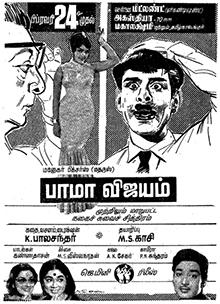
Bama Vijayam is a 1967 Indian Tamil-language comedy film directed by K. Balachander. The film features an ensemble cast including Sowcar Janaki, Rajasree, Kanchana, Jayanthi, Sachu, R. Muthuraman, Nagesh, Major Sundarrajan, Srikanth and T. S. Balaiah. It revolves around a man's three daughters-in-law who go to absurd lengths to impress an actress who becomes their neighbour.

Sri Krishnarjuna Yuddhamu is a 1963 Indian Telugu-language Hindu mythological film, produced and directed by K. V. Reddy under the Jayanthi Pictures banner. It stars N. T. Rama Rao, Akkineni Nageswara Rao and B. Saroja Devi, with music composed by Pendyala Nageswara Rao. The film was based on the Telugu play Gayopakhyanam written by Chilakamarti Lakshmi Narasimham in 1890. It was later dubbed into Kannada and into Tamil.
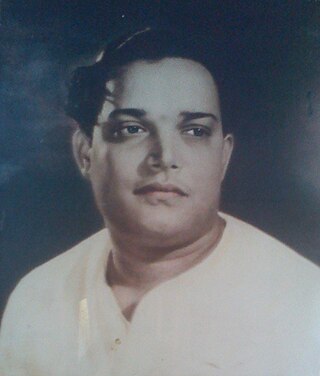
C. R. Subbaraman also known as C. S. Ram (1916–1952) was a famous South Indian film music composer and producer. He was born to Ramasamy at Chintamani village in Thirunelveli, in present-day Tamil Nadu. Music director Shankar of Shankar–Ganesh duo was his younger brother. His ancestors were from the Krishna district of present-day Andhra Pradesh and due to this, his family spoke Telugu well.

Thiruchirappalli Govindarajulu Lingappa was an Indian music director who worked predominantly in Kannada language films. He also worked in Tamil and Telugu movies. He was the son of G. Govindarajulu Naidu who was also a musician.
Sozhavanthan Varadharajan Venkatraman, also known as SVV, was an Indian actor, singer, and music director, who was active in the Indian film industry from 1938 to the 1970s.

Kathiruntha Kangal is a 1962 Indian Tamil-language film directed by T. Prakash Rao. The film stars Savitri and Gemini Ganesan, the former in dual roles. It is a remake of the 1960 Bengali film Smrithi Tukku Thak, which itself was adapted from the Bengali play of the same name by Malabika Roy. The film revolves around twin sisters who get separated at birth due to circumstances, and cross paths as adults. It was released on 25 August 1962, and emerged a commercial success.
Krishna Krishna is a 2001 Indian Tamil language comedy film directed by S. Ve. Shekher, making his directorial debut. The film stars S. Ve. Shekher and Sukanya, with Vennira Aadai Moorthy, Sriman, Chinni Jayanth, Thyagu, Ramesh Khanna, Manorama, and Kovai Sarala playing supporting roles. The film was released on 8 June 2001. The film was adapted from S. Ve. Shekher's stage drama Adhirshtakaran.
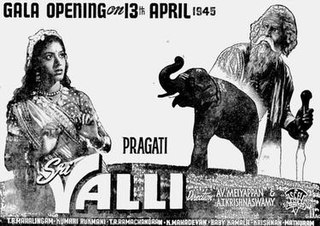
Sri Valli is a 1945 Tamil-language film co-directed by A. V. Meiyappan and produced by him under Pragathi Studios. It was co-directed by A. T. Krishnaswamy who also wrote the script. The film stars T. R. Mahalingam and Kumari Rukmani. Sri Valli revolves around the romance between Muruga and Valli, a tribal girl. The rest of the story shows how Valli wins the heart of Murugan.
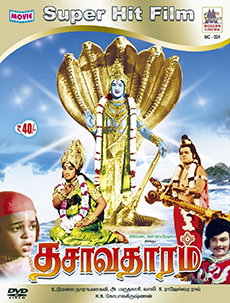
Dasavatharam is a 1976 Indian Tamil-language Hindu mythological film, directed and written by K. S. Gopalakrishnan. The film, based on the Dashavatara of Vishnu, features an ensemble cast, including Ravikumar as Vishnu. It was released on 15 January 1976.
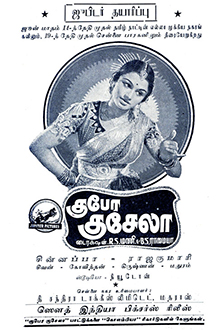
Kubera Kuchela is a 1943 Indian Tamil-language Hindu mythological film directed by R. S. Mani and written by B. S. Ramaiah. The soundtrack was by Kunnakudi Venkatarama Iyer and background music by S. V. Venkat Raman. The film stars P. U. Chinnappa T. R. Rajakumari, D. Balasubramaniam and P. S. Govindan.
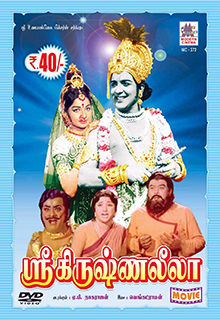
Sri Krishna Leela is a 1977 Indian Tamil-language Hindu mythological film, written and directed by A. P. Nagarajan. The film was produced by R. M. Subramaniam, with music from S. V. Venkatraman. Sivakumar starred in the title role with Jayalalitha, Srividya, Nagesh, R. S. Manohar taking supporting roles. This also marked Jayalalithaa's last film during the 70s era.

Chinna Durai is a 1952 Indian Tamil-language romantic thriller film, directed and produced by T. R. Mahalingam, and written by K. D. Santhanam. The film stars Mahalingam, S. Varalakshmi and G. Sakunthala, with V. K. Ramasamy and Chandrababu in supporting roles. It is based on the novel Irumana Mohinigal, by Vaduvoor Duraisamy Ayyengar. The film was released on 22 August 1952 and failed at the box office.

Thamarai Kulam is a 1959 Indian Tamil language film directed by Muktha Srinivasan, written by S. R. Natarajan and produced by him along with S. R. Veerabahu. The film stars features Sowcar Janaki and V. Gopalakrishnan. M. R. Radha, N. N. Kannappa, K. Sarangapani, V. S. Raghavan, S. A. Ashokan, Kaka Radhakrishnan, S. N. Lakshmi, Padmini Priyadarshini, and Nagesh in his film debut play supporting roles. The film was released on 14 April 1959.

S. C. Krishnan (1929-1983) was an Indian actor and playback singer who worked mainly in Tamil dramas and films.
Bama Vijayam is a 1934 Indian Tamil-language film directed by Manik Lal Tandon. The film featured G. N. Balasubramaniam who made his debut in Tamil cinema, M. R. Krishnamurthi, P. S. Ratna Bai and P. S. Saraswathi Bai in the leading roles. P. S. Ratna Bai and P. S. Saraswathi Bai are well known as Palayamkottai Sisters.
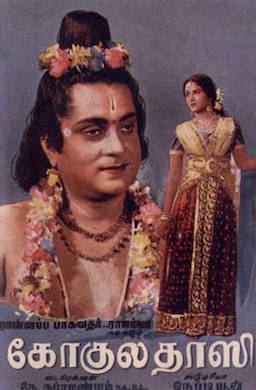
Gokuladasi is a 1948 Indian Tamil language film directed and produced by K. Subrahmanyam. The film stars C. Honnappa Bhagavathar and M. V. Rajamma, with T. R. Ramachandran, N. Krishnamurthi, Lalitha and Padmini playing supporting roles.

Ponnu Vilayum Bhoomi is a 1959 Indian Tamil-language drama film directed by A. Bhimsingh. The film stars Gemini Ganesan and Padmini.
